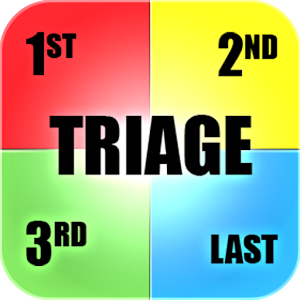From our colleague Amy Scheinerman:
It is believed that the practice of triage originated in France toward the end of the 18th century thanks to Napoleon’s surgeon Dominique-Jean Larrey (1766-1842), who invented the Ambulance Volante (“flying ambulance”), a corps of horse-drawn ambulance-wagons and personnel that shuttled casualties from the battlefield to a base hospital in less than 15 minutes. Dr. Larrey also introduced triage – from the French “trier” meaning “to sort out” or “select” – whereby a surgeon was present on the battlefield to administer to the needs of the wounded and determined that (in his words) the most “dangerously wounded should receive the first attention, without regard to rank or distinction. They who are injured in a less degree may wait until their brethren-in-arms, who are badly mutilated, have been operated and dressed, otherwise the latter would not survive many hours; rarely until the succeeding day.” Triage, which arose in the context of war and was developed to address mass casualties, is used today not only in warfare, but in modern hospital emergency rooms. In the venue of a hospital on a normal day, it is far easier to sort out the most serious cases and address their needs first than it is in the chaos and pandemonium than can ensue from a terrorist action. When limited resources are available, and seeing to the needs of one injured person might have grave consequences for another who is not immediately attended to, the original philosophy of triage comes under scrutiny.
In 2008, the Ethics Committee of the Israeli Medical Association set in practice a policy that gave priority to Israeli victims of terrorism (both Jewish and Arab) over perpetrators in multi-casualty terrorism situations. This was based on “the poor of your city take precedence” (B. Bava Metzi’a 71a). Last December, in response to an appeal by Physicians for Human Rights, the Ethics Committee revisited the policy and changed the guidelines (Hebrew). The policy was amended to come into compliance with international standards. Now triage is to be done based purely on the condition of those injured and the urgency of their medical needs, without regard to whether the person is a terrorist or a victim.
On the one hand, had this been the case earlier, it is possible that the Eritrean national who was mistaken for a terrorist, beaten, and shot might have received medical attention earlier and perhaps have survived. On the other hand, it is possible that attending to the medical needs of terrorists will cause some Israelis their lives. And on a third hand, in the chaos that ensues following a terrorist attack, it is not always possible to discern precisely who is a terrorist and who is a Jewish or Arab victim.
Needless to say, the new policy (promulgated in the midst of the latest round of terror incidents) has caused a hailstorm of protest. In thinking about this conundrum, it seems that both approaches are black-and-white: treating all Israelis before any others, without regard to the severity of the injuries, makes emotional sense to many, but not necessarily medical and moral sense. Yet in a case where both attackers and victims are severely (but not equally) injured, the view of those who oppose the new policy is entirely understandable. Prof. Asa Kasher, philosopher and linguist, and author of the IDF Code of Ethics reacted to the change this way: “Suppose there are two wounded,” he says, “one slightly worse than the other, the latter being the terrorist. Would you treat him first and the victim second? This is unthinkable … suppose in such a case the victim dies because the physician didn’t have time to treat him – we will tell the family that we are sorry, we didn’t have a choice but to treat the terrorist? This is absurd.” Clearly, his argument is emotionally compelling. But is it philosophically and ethically appropriate? Does the text from Bava Metzi’a, which addresses tzedakah, speak to this situation?
Rabbi Yuval Cherlow, founder of the Tzohar Rabbinical Organization and head of its Ethics Committee, has been quoted as calling for what might be seen as a hybrid of the former policy and the current policy: “In all cases of terrorist attacks, the medical teams should treat the victims and only thereafter the attacker. Only in those instances where there is confusion to the extent that it cannot be easily determined who is the terrorist and who is the victim should the medics choose to first treat the most heavily injured.” But how practical is that standard, and how likely is it to be correctly implemented?
Does Bava Metzi’a 71a adequately address this situation? How does pikuaḥ nefesh inform the decisions that must be made on the scene and in a moment? Do Jewish ethics conform to international standards of triage or suggest another approach?
